ADF STAFF
Nigerien Chief of Staff of the Army Col. Maj. Mamane Sani Kiaou has worked closely with the United States military in recent months to arrange for the phased withdrawal of U.S. troops from the West African country.
Kiaou and a delegation from Niger’s Ministry of National Defense took part in a handover ceremony on July 7, as the last few U.S. troops boarded a C-17 transport plane and departed Air Base 101 in Niamey.
“The effective cooperation and communication between the U.S. and Nigerien armed forces ensured that this turnover was finished ahead of schedule and without any complications,” Niger’s defense ministry and the U.S. Department of Defense said in a joint statement.
More than 766 soldiers have left Niger since the request for the U.S. to withdraw its nearly 1,000 military personnel from the country was given in April.
U.S. Air Force Maj. Gen. Kenneth Ekman told reporters that several small teams of 10 to 20 U.S. troops, including special operations forces, have moved to other countries in West Africa. But most of the personnel initially will go to Europe.
Ekman, U.S. Africa Command’s director for strategy, engagement and programs, is leading the U.S. military withdrawal.
“Today we reflect positively on the past 15 years of security cooperation and shared sacrifice by U.S. forces and Nigerien forces,” he said in a statement. “I am grateful for the close collaboration with our Nigerien hosts to support the safe, orderly and responsible withdrawal of U.S. forces commemorated today at Air Base 101.”
Fewer than 500 remaining U.S. troops will leave the base in Agadez in August, ahead of the September 15 deadline set in the withdrawal agreement with Niger.
The U.S. has pledged not to destroy equipment or facilities as it leaves Air Base 201, which had served as a critical hub for counterterrorism surveillance and operational support. The facility gathered intelligence about violent extremist organizations in the Sahel linked to al-Qaida and the Islamic State group.
“Our goal in the execution is, leave things in as good a state as possible,” Ekman said. “If we went out and left it a wreck or we went out spitefully, or if we destroyed things as we went, we’d be foreclosing options that both nations need for the future. And our security objectives are still entwined.”
Ekman lamented the challenge of battling multiple insurgencies in the Sahel while no longer having access to Niger. Its border region with Burkina Faso and Mali has become one of the world’s most active terrorism hotspots.
“Niger was immensely helpful for us as a location because it was in the Sahel and it was adjacent to those areas where the threat is most concentrated,” Ekman said.
The U.S. has expressed its desire to work with Niger on future military collaborations.
“We have yet to define the next chapter of our bilateral security relationship with Niger,” Ekman said. “As we do, our close collaboration on the Air Base 101 withdrawal will help set the tone for those discussions.
“That next chapter will also involve other regional militaries as we adjust our presence and activities in West Africa to pursue mutual security objectives. United States Africa Command will maintain our focus on building partner capacity and strengthening relationships and trust. We are committed to listening to West African militaries to best support their partner-led, U.S. enabled operations to counter violent extremism and improve security and stability.”

